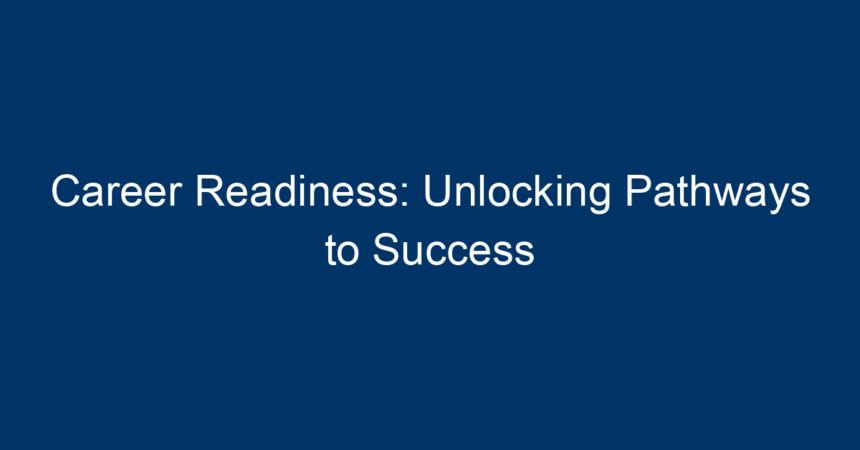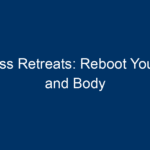In today’s ever-evolving job market, career readiness has become more crucial than ever. As the demands of employers shift and the landscape of work transforms, individuals must equip themselves with the necessary skills, experiences, and mindsets to embark on fruitful careers. But what exactly does career readiness entail, and how can you prepare effectively? This comprehensive guide will explore the concept of career readiness, its key components, and actionable steps you can take to unlock your pathways to success.
Understanding Career Readiness
What is Career Readiness?
Career readiness refers to the attainment of skills and competencies that prepare individuals to succeed in the workplace. This includes not only technical skills related to specific fields but also essential soft skills that foster effective communication, problem-solving, and teamwork. As businesses seek employees who can navigate complex challenges, career readiness emphasizes a holistic approach to personal and professional development.
The Importance of Career Readiness
In an era marked by rapid technological advancements and globalization, employers are increasingly focusing on candidates who possess a well-rounded skill set. According to studies, employers consistently prioritize soft skills—like interpersonal communication and adaptability—alongside technical expertise. This makes career readiness vital for job seekers of all ages, whether you are a recent graduate or someone looking to switch careers.
Key Components of Career Readiness
To effectively prepare for the workforce, consider the following key components associated with career readiness:
1. Technical Skills
Technical skills are the specific knowledge and capabilities required within a particular industry. These include proficiency in software, data analysis, programming languages, or any specialized tool relevant to your field.
How to Develop Technical Skills:
- Enrol in Courses: Use platforms like Coursera, Udemy, or local community colleges to build your technical knowledge.
- Certifications: Consider obtaining certifications relevant to your industry, which can enhance your resume and demonstrate your commitment to continuous learning.
2. Soft Skills
While technical skills are crucial, soft skills play an equally significant role in career readiness. These include emotional intelligence, teamwork, leadership, and adaptability.
How to Cultivate Soft Skills:
- Engage in Team Projects: Participate in group activities or volunteer work that requires collaboration.
- Seek Feedback: Regularly ask for constructive criticism from peers and mentors to identify areas for improvement.
3. Practical Experience
Hands-on experience not only solidifies what you’ve learned but also makes you more attractive to employers. Internships, co-op programs, and part-time jobs can enhance your understanding of the workplace.
How to Gain Practical Experience:
- Internships: Target internships related to your field of study or interest; they are an excellent way to gain practical exposure.
- Networking: Use professional platforms like LinkedIn to connect with industry professionals and learn about potential opportunities.
4. Networking and Personal Branding
Building a robust professional network opens doors to various opportunities. Personal branding involves establishing your professional identity and reputation.
How to Build Your Network:
- Attend Events: Participate in industry conferences, workshops, and networking events to meet professionals.
- Online Presence: Create a compelling LinkedIn profile and engage with relevant content to showcase your expertise.
Strategies for Enhancing Career Readiness
Achieving career readiness is not a destination; it’s an ongoing journey. Here are several strategies to continually enhance your readiness for career success:
1. Set Clear Goals
Goal-setting is a foundational step in career readiness. Define both short-term and long-term career objectives to guide your development.
How to Set Effective Goals:
- SMART Goals: Ensure your goals are Specific, Measurable, Achievable, Relevant, and Time-bound.
- Regular Assessment: Revisit and adjust your goals as necessary to ensure they align with your evolving aspirations.
2. Continuous Learning
The job market is constantly changing, and staying stagnant can hinder your career readiness. Cultivating a mindset of continuous learning encourages growth and adaptability.
How to Embrace Lifelong Learning:
- Read Widely: Stay updated with industry news through books, articles, and podcasts.
- Professional Development: Attend workshops, webinars, and training sessions related to your field.
3. Seek Mentorship
Mentorship can provide invaluable insights and guidance as you navigate your career path. A mentor can offer advice, introduce you to networking opportunities, and support your personal and professional development.
How to Find a Mentor:
- Professional Organizations: Join industry-specific organizations where mentorship programs may be available.
- Alumni Networks: Connect with alumni from your school who work in fields you’re interested in; they may be willing to guide you.
4. Build Resilience and Adaptability
Instruments of change are ubiquitous in the workplace—from new technologies to fluctuating market demands. Developing resilience allows you to navigate challenges effectively.
How to Enhance Resilience:
- Stay Positive: Focus on solutions rather than problems; a positive mindset fosters resilience.
- Learn from Failures: Treat setbacks as learning experiences, adapting your approach as needed.
Actionable Insights for Career Readiness
Career readiness is not just about preparing for your first job; it’s about establishing a foundation for lifelong career success. Here are actionable insights to take your career readiness to the next level:
-
Create a Professional Development Plan: Outline specific skills you wish to acquire over the next year, including resources and timelines.
-
Volunteer or Freelance: Gain experience while contributing to meaningful causes or projects; these opportunities can enhance your resume and portfolio.
-
Engage in Mock Interviews: Practice your interviewing skills with friends or mentors to increase your confidence during actual interviews.
-
Utilize Online Resources: Take advantage of career readiness resources available through websites, civic organizations, and educational institutions.
- Stay Informed: Subscribe to newsletters and blogs in your field to remain aware of trends, job opportunities, and best practices.
Conclusion
Career readiness is an essential component of success in today’s competitive workforce. By developing a balanced mix of technical skills, soft skills, and real-world experience, you can position yourself for a thriving career. Embrace continuous learning, foster valuable professional connections, and remain adaptable to the ever-changing landscape of work.
By taking these actionable steps and committing to your development, you’ll unlock the pathways to a successful career. Remember, your journey toward career readiness is just beginning—embrace it with enthusiasm and determination!




